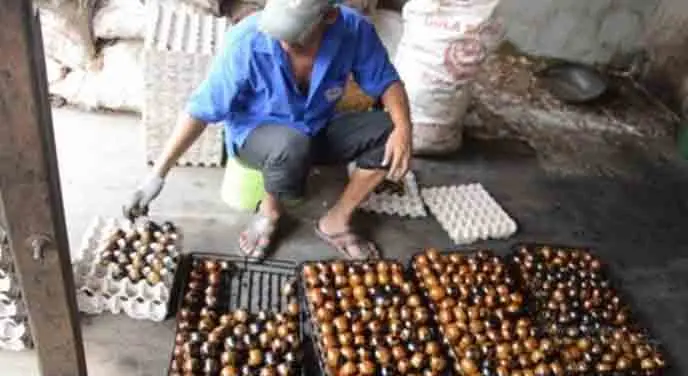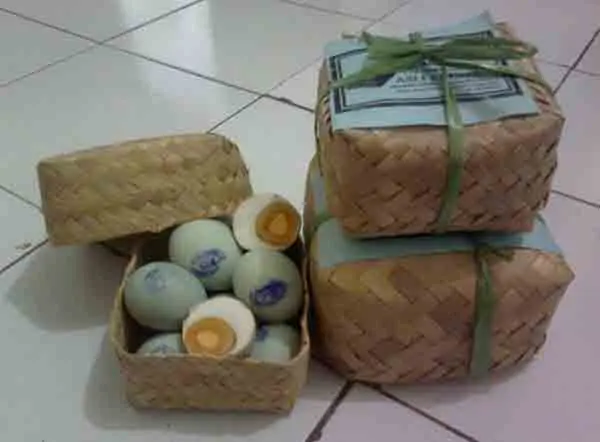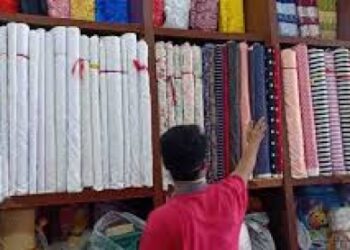A. Level of People’s Welfare in Brebes District
The socioeconomic life of Brebes sub-district cannot be released from the development of salted egg businesses that contribute to people’s livelihoods. The situation can be seen by the changes that occur in society, especially the socioeconomic field. The development of salted egg business is a way for farmers to improve their living standards and can support their life needs.
Before the development of the salted egg industry, the main livelihood of the people of Brebes Sub-District was as farmers. It is understandable that the agricultural sector for rural communities is still the main focus to meet the needs of his family, but around the 1970s, namely after the development of the salt egg industry, the livelihoods of the residents of Brebes Sub-District little by little began to switch from agriculture to industry and it is not uncommon to be a farmer and as an entrepreneur. The economy of Limbangan Wetan Village and Brebes Village is supported by agriculture, egg industry and so on in the field of services and trade. For more details, the livelihoods of the residents of Brebes Sub-District can be seen on the table
below
Table
Penduduk Kabupaten Brebes Berdasarkan Mata Pencaharian
| Types of work | Year | |||
| 1989 | 1996 | 2000 | 2005 | |
| farmers | 10493 | 23903 | 16800 | 18051 |
| farmworkers | 17305 | 22802 | 25634 | 31931 |
| state employees and Soldiers | 549 | 1499 | 10155 | 12266 |
| Pedagang | 1765 | 5883 | 6323 | 10378 |
| laborers or employees | 6268 | 7238 | 10867 | 10008 |
| self-employed | 186 | 625 | 268 | 1350 |
| Total | 36566 | 61950 | 70047 | 83984 |
Source: Badan Pusat Statistik. (1989, 1996, 2000, 2005) Kabupaten Brebes dalam angka. Brebes: Kantor Statistik Kabupaten Brebes
Based on the table above, the majority of the livelihoods of the people of Brebes Regency, are as farmworkers which amount to 40.67% of the total population. This is because the entire area in Brebes Regency is mostly used by rice fields which is 63,343 hectares. The next livelihoods that are the second largest people’s livelihoods after farmworkers are farmers (26.02%), laborers or employees (14.57%), traders (10.08%), state employees and Soldiers (5.57%), and the self-employed (3.09%).
Since its development, the salted egg industry has brought positive dapak to the lives of a number of people, especially the people of Brebes Sub-District. In line with the development of production and marketing, the number of workers also increased. In other words, the industry is able to absorb the workforce of a number of citizens. The existence and success achieved by the salted egg industry has little effect on society and families. A positive influence for the community is to provide job rides and provide inspiration that encourages others to excel, following the success of the business. In other words, the success of this industry gave birth to new salted egg entrepreneurs who by themselves will create jobs that benefit the community.
THE INFLUENCE OF THE SOCIO-ECONOMIC SALTED DUCK EGG INDUSTRY IN BREBES 1970-2005
B. Income Level of Salted Egg Industry Entrepreneurs
The profession of being a salted egg entrepreneur has contributed to efforts to improve the well-being of its people. The income earned from this salted egg business can meet their daily needs, especially the needs of the people of Brebes Sub-District who are directly involved in this business. The income from this salted egg business is erratic every month because it depends heavily on the market’s interest in salted eggs. Meanwhile, the existence of this industry can also affect the level of income received by people in Brebes Sub-District who are involved in such industrial activities. The authors try to compare the amount of income with expenses. Here’s a breakdown of the earnings.
Table
Classification of Spending and Income of Salted Egg Industry Entrepreneurs In One Month In 1990
|
Entrepreneur Name |
Family Members |
Income |
Variabel Pengeluaran |
Remaining Profit |
|||
|
Clothing |
Food |
Home |
Others |
||||
|
H. Komarudin |
4 |
7.959.200,- |
300.000,- |
400.250,- |
200.000,- |
500.000,- |
6.558.950,- |
|
Ibu Titin |
5 |
1.774.800,- |
150.000,- |
500.500,- |
150.000,- |
250.000,- |
724.300,- |
|
Ibu Mulyani |
5 |
1.506.400,- |
150.000,- |
500.700,- |
150.000,- |
250.000,- |
455.700,- |
H. Komarudin is a craftsman and owner of shop in Brebes Village. The profits from the salted egg industry are one of which is used to bear the cost of living of his wife and two children. From the above details, it is known that H. Komarudin benefited sufficiently from the results of the salted egg industry. Daily expenses are used to buy rice, side dishes such as fish, vegetables and others. The rest of his income is used to meet other living needs such as paying credit to banks, health costs, buying vehicles, clothing, household appliances, social activities, marriage and circumcision and some of his profits are also saved to increase capital to grow his business. In addition, H. Komarudin invested his profits by buying rice fields in other areas.
In 1990, Mulyani and his family spent about Rp.1,050,700,-. He earned Rp 455,700,-. From the explanation is known that Mulyani earns a lower profit compared to other entrepreneurs. Based on the informant can be known that the entrepreneur has a large profit from his business. Most of the benefits are used to meet the needs of families both primary and secondary needs.
Read also : Salted Duck Eggs Part 1, Part 2, dan Part 3
C. Workers Income Level
The welfare of these workers can be seen from the amount of salary earned from the salted egg industry. Workers in this industry are given different salaries according to their position and the type of job they are responsible for. The position they are in has a different level of difficulty that requires a high level of patience and tenacity.
Salaries received by workers are used to meet daily needs, such as to buy rice, side dishes, and others. In looking at the welfare level of workers in the salt egg industry, the authors took reference to the Mínimum District Salary / MSME which took effect in 1990, where by the Labor Office set the Minimum Salary of Brebes Regency for the industrial sector is Rp. 115,000/month. The following will be presented the salaries of the workers in the salted egg industry with the positions they live in.
Table
Comparison of Average Monthly Salary of Salted Egg Industry Workers 1980-2005
|
Year |
Job Specialist |
||
|
Washing Eggs |
Production Process |
Filling, Packing and Kiosk Guards |
|
|
1980 |
95.000,- |
100.000,- |
88.500,- |
|
1990 |
156.000,- |
182.000,- |
140.000,- |
|
2005 |
332.000,- |
416.000,- |
300.000,- |
Based on the table above the wages of workers each year has increased adjusted to the daily basic blindness from year to year continues to increase, so inevitably employers increase the number of labor salaries, for example in the salted egg wash section, the salary earned depends on the number of crates that can be completed. In 1980 each crate (300 items) was given a salary of Rp. 5,- per item. Every day workers wash eggs as much as 1 crate then on average each month get a salary = (Rp 5,- x 1 crate) x 20 days = Rp.30.000. For 1990 was given a salary of Rp. 10 per grain. Every day workers wash eggs as many as 2 crates then on average each month get a salary = (Rp 10,- x 2 crates) x 26 days = Rp.156.000. While in the following years continues to increase until in 2005 each grain is valued at Rp. 20,- and the worker washes eggs approximately 2 crates, then every month the average salary (Rp. 20,- x 2 crates) x 26 days = Rp. 312,000 ,.
The impact that can be felt by employees is the amount of salary in meeting daily needs. Workers’ salaries from 1970-2005 saw an average increase. The raise is sufficient to meet the standard of its needs judging by the development of retail price of staples in Brebes Regency.
Based on the average monthly salary earned, the researchers took three workers as samples, namely Jaenal, Roidah and M. Risqi, to see how much the worker’s ability to meet his life needs. The election of the three workers is because they have long pursued the following jobs. Therefore, the author will explain about the welfare level of the workers in the table as follows:
Table
Classification of Income of Salted Egg Industry Workers in One Month 1990
| Entrepreneur Name | Income | Purchase Variables | Remaining Profit | |||
| Clothing | Food | Home | Others | |||
| Jaenal | 182.000,- | 20.000,- | 82.500,- | 15.000,- | 10.000,- | 54.500,- |
| M. Risqi | 182.000,- | 25.000,- | 95.700,- | 10.000,- | 15.000,- | 36.300,- |
| Roidah | 156.000,- | 19.000,- | 84.500,- | 9.500,- | 10.000,- | 33.000,- |
Based on the table above, it can be seen that the expenses and income of the workers in 1990 experienced this difference due to the living needs of the workers who are one another depending on the number of family dependents and basic daily needs. Jaenal is a worker who works in the production section. Every month earns a salary of Rp. 182,000,-, after being used to meet daily needs by his family (Jaenal, wife and one child), Jaenal still has the remaining income of about Rp. 54,500,-. According to Jaenal the rest of his income was spent on buying household appliances, clothing, savings and health expenses (Jaenal Interview, June 2012).
M. Risqi is a production worker in one month earning a salary of Rp. 182,000,-. M. Risqi used most of his income for his family’s living needs (M. Risqi, wife and two children). M. Risqi still gets the remaining income of about Rp 36,300,-, which is used to buy other needs that can still be reached. In addition, M.Risqi was assisted by his wife selling klontongan stalls at home. (M.Risqi Interview, June 2012).
Roidah works as a duck egg sorter, the salary received is Rp156.000,-/month. This salary is used by Roidah for the needs of his family of four. Roidah’s income is combined with her husband’s income to meet her kelurga needs (Roidah, husband and two children), the salary roidah received while working in the salted egg industry is enough to meet her needs (Roidah Interview, June 2012).
In general, the salary received by the above workers, can be said to be sufficient. Basically the salary is used to meet the basic needs of his family in the form of rice, side dishes, while the rest of his income is used to buy other goods such as clothing, electronic devices, household furniture and other secondary needs. This large number of salaries caused the workers to keep their jobs. From the above picture of workers’ salaries, it can be seen from the level of well-being of their lives based on the criteria of social stratification, lifestyle, and education that have been discussed before, as well as the physical condition of their home.
Read also : Salted Duck Eggs Part 1, Part 2, dan Part 3
D. Socio-Economic Changes in Brebes Sub-District
Changes in society are assumed in the behavior of social institutions related to their lives, as well as the values that form the frame of reference in their lives. In addition, the salted egg industry in Limbangan Wetan village and Brebes Village also influences people’s perception or view of new things in their lives.
The socioeconomic life of Brebes sub-district cannot be released from the development of the salted egg industry that contributes to the provision of jobs for the surrounding community. The industry has been going on since 1959 which was originally pioneered by In Tjiaw Seng. Along with the development of salted egg industry continues to progress and has influenced the brebes community, because in the end many people are interested in participating in developing the salted egg industry so as to make Brebes Sub-district known as the salted egg producing sub-district in Brebes Regency.
The development was supported by the socioeconomic life of brebes sub-district, especially in Brebes village and Limbangan Wetan which had not previously made significant progress. In terms of livelihood, the people of Brebes Sub-District generally work as farmworkers, farmers, cattle laborers and so on, so that can be seen from the sociological aspect that farmers want to learn to try something new.
Some of the people of Brebes Sub-District are working on the salted egg industry as one of the livelihoods because it is considered to be able to meet promising opportunities for the community. This can be proven by the development of several salted egg industries in Brebes Sub-district with different brands. Thus the existence of this industry has a positive impact on industrial entrepreneurs as well as to the surrounding community, because it provides opportunities to work in the field of industry. The development of the salted egg industry is a way for industry owners and workers to improve their living standards. It is also used as a livelihood that can meet his life needs.
The salted egg industry in Brebes sub-district developed rapidly around 1980-1990. During this period, the salted egg industry experienced an increase in the amount of production and expansion of marketing areas. This resulted in the salted egg industry mushrooming in various regions, especially Brebes Sub-District and was able to become an economic backup for the surrounding community. With the rapid growth of salted egg industry in Brebes Sub-district, causing very low urbanization flow. They’d rather work in their own area than have to go to town. They assume that the work in the village is also there for what they have to go to the city. Mobilization from village to city is done if there are certain interests such as walking around and visiting relatives.
One of them is socio-economic change that makes one dynamic in people’s lives. The development of the salted egg industry on a small scale is a way for people to improve their lives and as a reliable livelihood to meet the needs of daily life and even provide a decent education for their children.
In addition to the economic changes caused by the salt egg industry, it has an impact on the social condition of entrepreneurs and their workers, namely experiencing social mobility. Every entrepreneur and worker has the opportunity to change their position from the lower social layer to the upper social layer or from the middle social layer to the upper social layer. Social mobility is seen in salted egg industry owners and employees working in the salted egg industry. This happens on the Topic of owners of the salted egg industry cap Topik Jaya. At first Topik was an employee in the salted egg industry cap Setuju Jaya. But after gaining enough experience, Topik kelur from the salted egg industry Setuju Jaya and established a salted egg industry named Topik Jaya. In 1990-2000, the salty egg industry developed rapidly and became one of the famous salted egg products of Brebes. The salty egg industry was able to survive despite being affected by the monetary crisis that hit Indonesia in 1997.
Social mobility as expressed above can be interpreted as a movement in the social structure that is certain patterns that govern the organization of a social group. Social mobility is divided into two types, namely horizontal and vertical social movements. Horizontal social movement is the transition of an individual or other social object from one social group to another equal social group. While vertical social movements are intended as the transfer of individuals or other social objects from a social position to another social position that is not equal.
In addition to being profitable for entrepreneurs and workers, with the salted egg industry in Brebes Sub-district it is also profitable for duck egg farmers as a supplier of salted egg raw materials. The number of Brebes who work in the profession as duck breeders is not separated from the profit that can be generated from this activity, with less capital and easy maintenance, a novice duck breeder (one year) can on average get Rp.50.000 to Rp.150.000 per day. Even if the number of ducks above 1,000 is able to profit Rp.300,000 per day, for example Haryanto duck breeder in Limbangan Wetan Village, Brebes sub-district has 600 ducks in its cage, with the production of 350 eggs to 400 eggs daily, with the price of duck eggs 2005 ranging from Rp.700 to Rp.800 per grain, in a day Haryanto gets a yield of about Rp.300.000. Gross income is reduced by the purchase of feed and medicines around Rp. 150,000 , thus, in a day Haryanto got a net profit of Rp.150,000, with a considerable income from farming Haryoto finally decided to focus on becoming a duck farmer. Haryanto’s considerable income can buy some luxury household appliances such as refrigerators, televisions and so on. In addition, Haryoto was also able to send his children.
The success of salted egg industry entrepreneurs in Brebes Sub-district, in the period 1970-2005 only a few people can change the fate of those who used to work as laborers gradually able to improve their employment status. The shift in employment occurred in some communities outside the salted egg industry that had a high enough capital then established a similar industry that led to the emergence of this industry in other areas, although at that time it was not yet a rival to the industry that had previously developed.
The emergence of industry in an area will have an impact on the surrounding community. In Brebes sub-district after the development of the salted egg industry has influenced the social life of the community. A very real influence with the emergence of new classes in society, namely with the birth of the entrepreneur group, workers and so on thus resulting in a new social stratification based on the culture of the surrounding community. Social stratification according to Pitirim A. Sorokin is the distinction of the population or society into hierarchical classes. Its embodiment is the higher classes and the lower classes.
The onset of social stratification will also affect the lifestyle of the surrounding community, where attitudes and lifestyles become more consumptive. In terms of the level of education there is also a significant change, where at first the local community only cares about the skill to develop their business by fewer education, now the successors of the salt egg business seem to care more about the level of education. This is because, there is an increasingly advanced era with increasingly tight competitiveness. With this competitiveness, industry owners are required to be more educated in order to be able to compete with other entrepreneurs in terms of innovating. It was also the circumstances that prompted the change in the Brebes community. Finished discussion about the development and influence of salted egg company in Brebes Regency and the impact of its influence on the socio-economic people. Thanks.
Read also : Salted Duck Eggs Part 1, Part 2, dan Part 3
BIBLIOGRAPHY
Martawijaya, Elang Llik, dkk. 2008. Panduan Berternak Itik Petelur Secara Intensif. Jakarta : AgroMedia Pustaka.
Scott, James C. 1994. Moral Ekonomi Petani. Jakarta: LP3ES.
Tambunan, Tulus T.H. 2003. Perekonomian Indonesia. Jakarta: Ghalia Indonesia.
Tjiptono, Fandy. 2002. Strategi Bisnis. Jakarta: Andi.
Murniatmo, Gatut dkk. 2005. Khazanah budaya Lokal. Yogyakarta: Adicita.
Putra, Heddy Shri Ahimsa dkk. 1992. Pola Perubahan Kehidupan Masyarakat Akibat Industri DIY. Yogyakarta: Depdikbud.

















